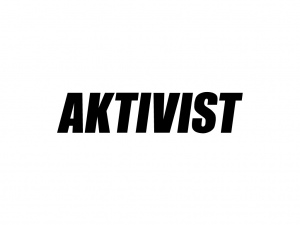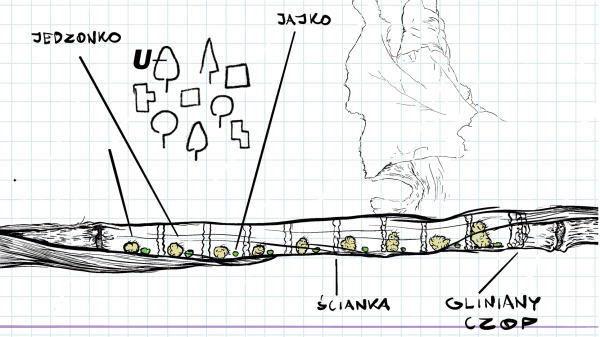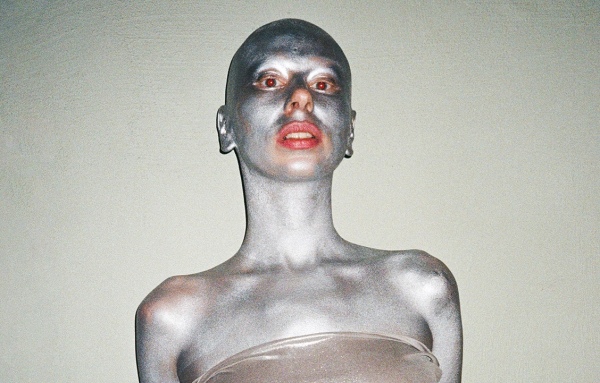14/05—01/06/2014
exhibition
Anna Okrasko
You are Mary, but in real you are Lynda, so if you want to marry as Lynda...
- Kaja Pawełek:
- Tell me more about the occupation of the school.
- Anna Okrasko:
- I decided to become a volunteer when I was attending a German language course in Babylonia, a school located in Kreuzberg, near the Görlitzer park and near the old school building that has been occupied by refugees for a year and a half. In Babylonia I met many people who were seeking asylum and activists who were involved in the occupation of Oranienplatz and the school building. It all started in October 2012, when refugees from different German states (Lands), from the so called Heims, where they are forced to live when they come to Germany...
- Kaja Pawełek:
- They are assigned to a specific Land?
- Anna Okrasko:
- Yes, when they start the asylum procedure, they are automatically assigned to a Land, they have to live in refugee centres and they are denied the right to travel freely within Germany: it is called Residenzpflicht. It started when a refugee from Iran committed suicide in one of those centres. After that, a protest march started in Würzburg in Bavaria. It lasted for several weeks and concluded by setting a protest tent camp on Oranienplatz in Berlin. The protest continued in Kreuzberg for a very long time, the eviction took place only a couple of weeks ago. In December 2012, when Winter started, the protestants decided to take control over the building of an abandoned school, at Ohlauerstr. Oranienplatz played the role of a political platform, where the refugees could protest against the asylum regulations, against being denied the right to work, being obliged to reside in a specific Land and against deportations. The school is a place where the refugees have found a shelter. Since the building was taken over, the doors are open for everyone who lives on the streets; for instance there is an entire floor occupied by Roma families. I guess that about 300 people live there. I visited that place for the first time with one of the activists, whom I met in Babylonia. We started with installing a shower on the floor where only women live and that hosts the office of the International Women Space group. Unfortunately, we were not able to achieve showers for the entire school: on the one hand, we had to face the opposition of officials who claimed that the building was too old to install showers in there; and on the other hand, a complete chaos and lack of communication among the residents themselves. I started to attend plenums organised by Women Space. It is a group of women – asylees and activists – who act jointly for the sake of female refugees, take part in protests against deportations within the whole German territory, organise workshops, print leaflets informing about asylum procedures, help female refugees to get in touch with lawyers, collect money and make sure that the voice of women is heard in the public debate on refugees. They also organise German language lessons and solidarity events. At one point I also took part in a workshop on asylum law in Germany, which was organised by women from that group. In Autumn last year, negotiations were started with the city, concerning the future of the building. The officials insisted that the residents should leave the school, because its condition is unsuitable for human residence. Moreover, they claimed that the city couldn‘t afford to pay for the heating and water consumed in the school. The refugees are not able to generate that money – this is obvious, because they don't have the right to work, they cannot participate in normal social structures in Germany. What is more, before the building was changed into a squat, it was promised for social projects of the local community – after a refurbishment it was supposed to serve them for offices. Naturally, the refugees didn’t want to leave the school: a part of them, together with the activists, requested help from the officials to find a shelter and fought for a permit to reside in Berlin. Social organizations interested in those premises expressed their solidarity with the refugees. I started to participate in the negotiations as an English-Spanish translator: mostly for Roma families. At this moment, after half a year of negotiations and after the evacuation of Oranienplatz, the city – for the first time – came up with a proposal of another place for the refugees. As far as I know, a part of them will refuse to move and have no trust for the officials; but for instance the Roma families are happy, because they have been waiting for social housing for months. The problem is that the school does not speak with one common voice. The interests and expectations of individual groups are different, sometimes contradictory, they depend on their respective legal situations, there is also a lot of chaos and lack of communication. Most people who live in the squat need immediate support: lawyers, therapists, doctors or people who would teach them German or help to address the asylum procedures properly. They need documents and the right to work. Some of them, of course, are afraid of deportation and are scared to reveal their identity. At the same time the activists say that if the refugees leave the building, they will lose the possibility of being present in the public space of Berlin, the possibility to protest, to be in touch with the volunteers, the activists, etc. It’s really very complicated. The meetings that take place in the schools are often very tense, and their only outcome is a deepening conflict...
- Kaja Pawełek:
- So the situation that we see in the film is a recording of one of such meetings?
- Anna Okrasko:
- It’s rather the result of a transcript of a workshop on law, which I did to prepare a leaflet that was translated into several languages. During that meeting I was explained what this asylum procedure is all about. But the video is not a documentary recording. I really tried not to reveal the identities of real people, because during the workshop many questions were asked about hiding and change of identity. The refugees who come to Germany learn from other asylees that it would be good to change their identity in order to avoid deportation.
- Kaja Pawełek:
- Or they say that they have lost their passport...?
- Anna Okrasko:
- Yes, because if the administration has a copy of your passport containing the visa of the EU country from which you came to Germany, and they also have your fingerprints, they can deport you at any moment. This is why people decide to change their personal data – name and surname or date of birth, or they say that they come from Nigeria, while in reality they are from Kenya, and so on. During the workshop, one woman asked the lawyer if they had any chance to stay in Germany if they didn’t get married. And the lawyer said that they didn’t. What is more, if you find someone whom you could marry, you must present your papers to the authorities. Then you risk being deported. People without papers have no chance to marry, to get a work permit, sometimes they live in the grey economy for many years. During the workshop, women also asked about the possibility to bring their children from Africa, and if they could be adopted by their partners in Germany. Moreover, we spoke of the right to work. In theory, after one year of stay in Germany, the refugees have the right to work, but the procedures are such that if there is an EU citizen interested in the same job, they always have priority. The women who took part in the workshop were already after the first interview that each refugee is obliged to give when they first ask for the asylum and are registered by the authorities. They go to that interview without a possibility to consult a lawyer, they don’t know how they should act, what they should say to turn the interview in their favour. Therefore, the women asked how they should have answered the questions and what they can do now to improve their situation. The issue concerning translations was very interesting. The lawyer said that during the interview each refugee has the right to ask for a female interpreter – for example if the woman seeking the asylum has to speak about being a victim of sexual violence; however - she said – she wouldn’t recommend her client to ask for a female interpreter in Berlin, because the woman who works there is very ill-disposed. Such stories, questions concerning change of identity and the advice that the lawyer gave – all that shows how nightmarish and absurd is the situation of those women.
- Kaja Pawełek:
- So those people don’t have the right of residence?
- Anna Okrasko:
- Most of them don’t. Sometimes their cases drag on for years. The people whom I met in Berlin often have the so called Duldung – which means that they have been denied the right to stay in Germany, but their deportation cannot be carried out for technical reasons, or they received a negative answer and want to appeal against that decision. In such situation, usually they need to document a chronic or mental illness and prove that they wouldn't receive adequate treatment in their country of origin. Or get married immediately. The people who came to Berlin in the protest march are violating the Residenzplicht every day. If they get controlled by the police, they will be given huge fines.
- Kaja Pawełek:
- Can we say that the change of identity was crucial for you? This situation has a double character – in a sense the change of identity happens anyway, when they leave their homeland and a totally new biographic chapter begins. And yet there is the second change – the fictitious one forced on them, which entails creating and adopting fictitious identities.
- Anna Okrasko:
- I was wondering how I could tell this story, creating completely fictitious female characters. This spectacle of disguise in which one actress embodies seven different characters, this carnival and theatralisation were meant to awaken interest and positive feelings in the viewers. And on the other side, to show this schizophrenic and absurd character of the situation of refugees. Because the asylum procedure focuses on establishing the identity of people who ran away from their countries, in order to deport them as soon as possible. This is why many people simply decide to lie. And later they have serious troubles. It is also important that the actress is white. On the one side, it is yet another signal showing that it’s fiction, pretending to be someone we're not. On the other side, I just wanted to be honest. I am white and I cannot represent the voice of African women. They represent themselves and tell their own stories much better on their own. This video is my interpretation of the existing situation. I wanted to have multiple voices in this artwork – seven different voices oscillating between total cacophony and solidarity expressed when chanting together during a demonstration – and I wanted them to sound a bit hysterical. The characters where designed to show roles forced onto those women externally. Their identity depends on the country where they come from, on the existing stereotypes about the immigrants and on how they adapt to the new situation – what roles they can/have to assume.
- Kaja Pawełek:
- Tell us about the different characters that appear in the film.
- Anna Okrasko:
- There is a pirate who asks all the “illegal” questions and she is my favourite character, because it seems to me that in such circumstances I would also cheat and hustle. Then there is this female lawyer overwhelmed by an excessive amount of work; who has to explain to those women how difficult their position is. She also has to cope with a situation of direct democracy, in which the women react very emotionally and sometimes ask her questions in a very pushy way. There is also a cheerful moderator who asks about different procedures and in general she’s a kind of a “no bullshit lady” who tries to get to know as much as possible and to control the situation during the meeting. There is a grandmother who keeps falling asleep during the workshop and who would like to bring her grandchildren from Africa. There are also two activists – one from Poland and another one from Germany; most of the time they argue and keep correcting one another. This is my experience from my participation in various plenum assemblies: it turns out that in case of Europeans their enormous egos play a huge role. Often it's impossible to interrupt them, they can talk about their political biographies for hours, they instruct everyone how to speak correctly. The activists know that politics and power in general boil down to fighting for language and imposing your language on others. The experienced German female activist is very sensitive to that and has a great capacity for creating slogans. Thanks to her, the voices of women can be heard in solidarity, singing together at a demonstration. Finally we also have an impersonal voice of inhuman, machine-like legal procedures; this voice speaks in German about regulations and when listening to it, we see a loudspeaker on the screen. I didn’t want to judge those voices, I wanted to show the complexity of the situation, without revealing personal stories of those women, their traumas. We are not supposed to be their judges, it is rather about showing how their lives are regulated by German law. And the obstacles those women have to face every day: disinformation, communication issues, cultural differences, even the question of their political affiliation or different world views. This work might be a bit didactic as well; the sound has been recorded like an audio-book for kids, you can learn something from it. I wanted to encourage the spectators - while listening to the voices of almost fairy-tale characters – to try and combine a difficult text produced in a legal language with all the personal, emotional voices.














